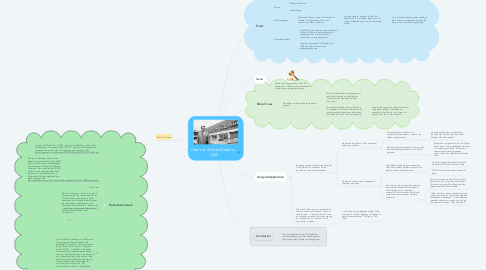
1. Module 2 Case
2. References Used:
2.1. Copy of Civil Rights Act of 1964. Government Publishing office of the United States. Recovered online 27Oct17. Used to reference specific language from parts of the law not given in the textbook. URL https://www.gpo.gov/fdsys/pkg/STATUTE-78/pdf/STATUTE-78-Pg241.pdf
2.2. Desiree A. Kennedy. Missouri Law Review. Volume 66 Issue 2 Spring 2001. A review of Consumer descrimination: The Limitations of Federal Civil Right Protection. Recovered online 27Oct17. Used for more understanding of the facts section, and whether or not Rolleston could have been sued by a black customer. URL http://scholarship.law.missouri.edu/cgi/viewcontent.cgi?article=3481&context=mlr
2.3. Class Text.
2.4. Library of Congress. (lov.gov) used as a reference to look up the text of both the 13th and 5th amendment for a better understanding of why Rolleston thought those had been violated in his case. Accessed online 29Oct2017. General URL is www.loc.gov/rr/program/bib/ourdocs/. There are subsections on each amendment.
2.5. Heart of Atlanta case blog on Tumblr.com. Case review of Heart of Atlanta v. US. Published 21 Mar 2013. Authors listed are Rachel, Matti, Chloe, Warren. Accessed online 27Oct17. Used for more general understanding of what happened during the case, and how the case came about, for both the analysis, and facts section. Also used for picture of Rolleston and Heart of Atlanta Motel, Picture credit added as comment to main map hub. URL Heart of Atlanta Motel v. United States
3. Issue
3.1. Whether the requirements of the Civil Rights Act of 1964 are unconstitutional in their effect on private businesses.
4. Rule of Law
4.1. Definition of what entities the law shall apply to.
4.1.1. The law includes specific language that racial discrimination is prohibited for "establishments affecting interstate commerce".
4.1.2. The plaintiff (Rolleston) argues that he is not engaged in interstate commerce, but rather says that his business is designed and intended only for local engagement.
4.1.2.1. The plaintiff must prove either that the law completely violates a constitutional principle, or that the law is not meant to apply to him, but is impacting him
5. Analysis/Application
5.1. Rolleston argues in federal court that the Civil Rights Act is overreach by the government, and unconstitutional.
5.1.1. He claimed his 5th and 13th amendment rights were violated,
5.1.1.1. 5th amendment contention: His property had been taken for public use without compensation
5.1.1.1.1. He was actually being compensated the same way that he was when he did business with white people.
5.1.1.2. 13th amendment contention: He proposed that he was being forced into involuntary servitude.
5.1.1.2.1. Rolleston's compliance to the Civil Rights Act does not fit any established definition of involuntary servitude. Rolleston is voluntarily performing business transactions at an establishment that he owns.
5.1.2. He claimed that he was not engaged in interstate commerce
5.1.2.1. The defendant (the US government) was able to show that Rolleston's custom was highly driven by interstate travel
5.1.2.1.1. He was marketing himself nationally and maintained billboards across his state.
5.1.2.1.2. 75% of his customers were from out of state.
5.1.2.2. Court opinion determines that when the law gives the government the right to affect regulation on "interstate commerce" that also includes the local components that make up interstate commerce
5.1.2.2.1. The correct answer to the critical thinking question on p73 of the text is that even if this were truly a small local business, the regulation would still be upheld
5.1.2.2.2. "If the interstate commerce feels the pinch, it does not matter how local the operation that applies the squeeze" - means that the interstate commerce is made up of all the businesses of all sizes. They all affect it.
5.2. The intent of the law is to reduce and/or disallow racial discrimination. Its spirit seems broad. It requires that you may not exclude someone from many aspects of society based on their race, color, nationality or religion.
5.2.1. In the introductory paragraph of title II, the act states that it shall apply to "All places of public accommodation" (78 Stat. p. 243, 1964)
6. Conclusion
6.1. The court upheld that the Civil Rights Act was constitutional, and did indeed apply to the business that Rolleston was engaged in.
7. Facts
7.1. Parties
7.1.1. Moreton Rolleston
7.1.2. United States
7.2. What Happened
7.2.1. Moreton Rolleston, owner of the Heart of Atlanta motel, preferred not to sell vacancies to black customers
7.2.1.1. He is obliged to, however, by the Civil Rights Act. It is no longer legal for him to refuse sale based only on his self admitted racism.
7.2.1.1.1. He could eventually have been sued by a black customer, however he brought the issue to court himself, suing the govt.
7.3. Procedural History
7.3.1. In the 1950's the supreme court case Brown v. Board of Education established that segregation was unconstitutional (in schools but broadly applicable)
7.3.2. Congress Passed the Civil Rights Act in 1964, this affected much more widespread change.

